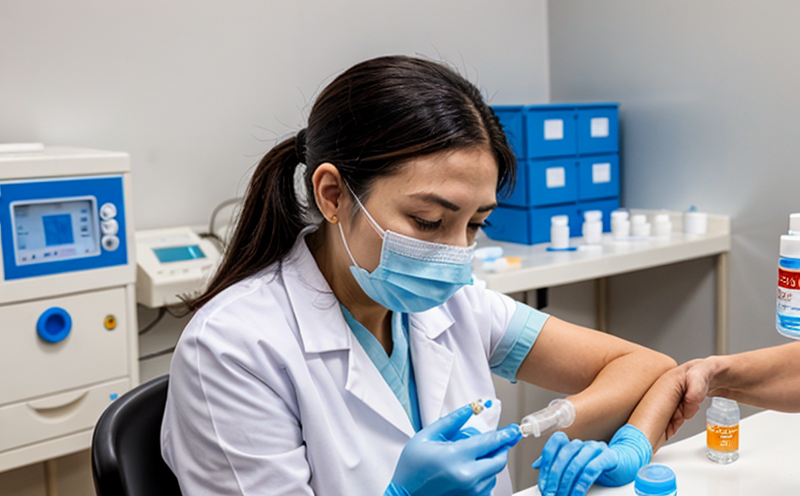Capillary Electrophoresis Vaccine Protein Testing
The development and testing of vaccines have become increasingly complex, requiring stringent quality control measures to ensure safety and efficacy. Capillary electrophoresis (CE) is a powerful analytical technique widely used in pharmaceutical laboratories for vaccine protein testing. This method provides high-resolution separation capabilities that make it ideal for assessing the purity, identity, and concentration of proteins within vaccine formulations.
Capillary Electrophoresis Vaccine Protein Testing involves the use of capillaries filled with buffer solutions to separate charged molecules based on their size, shape, charge, and hydrodynamic volume. In this process, a high voltage is applied across the capillary, which drives the ionic species through the medium. The separation allows for detailed analysis of proteins in vaccines, ensuring that they meet stringent quality standards.
The primary goal of CE testing in vaccine development is to verify the identity and purity of the protein components used in vaccines. This ensures that the final product meets regulatory requirements set by organizations such as the World Health Organization (WHO), European Medicines Agency (EMA), and the United States Food and Drug Administration (FDA). The technique also helps identify any potential contaminants or impurities that could affect vaccine efficacy.
A typical CE vaccine protein testing procedure involves several steps. First, the sample is prepared according to predefined protocols, ensuring accurate results. Then, the samples are injected into the capillary for separation based on their physical and chemical properties. After separation, the data is collected using a detector and analyzed to determine the presence of target proteins.
The high precision and accuracy of CE make it an essential tool in vaccine development. It allows researchers to identify and quantify even trace amounts of proteins, which can be crucial for understanding the effectiveness of different formulations. This capability ensures that vaccines are safe and effective, contributing significantly to public health.
Regulatory bodies often require detailed documentation supporting the safety and efficacy of each vaccine batch. CE testing plays a vital role in generating this data by providing reliable, reproducible results. By using CE technology, pharmaceutical companies can demonstrate compliance with international standards such as ISO 17025 for laboratory accreditation.
Scope and Methodology
The scope of Capillary Electrophoresis Vaccine Protein Testing encompasses several key aspects:
- Sample Preparation: Samples are prepared according to standardized protocols, ensuring that the proteins are in a form suitable for analysis. This includes steps such as dissolution and dilution.
- Injection: The prepared samples are injected into the capillary, where they undergo separation based on their physical and chemical properties.
- Separation: Capillaries filled with buffer solutions separate the proteins based on their size, shape, charge, and hydrodynamic volume.
- Detection: The separated components are detected using a laser-based detector. This provides real-time data for analysis.
- Data Analysis: Collected data is analyzed to determine the presence and concentration of target proteins.
The methodology used in CE testing ensures that each step is conducted with precision, ensuring accurate and reliable results. Compliance with international standards such as ISO 17025 further enhances the credibility of these tests.
Benefits
- Precision: Capillary Electrophoresis offers high-resolution separation, allowing for precise identification and quantification of proteins.
- Sensitivity: The technique can detect even trace amounts of proteins, making it suitable for identifying minor contaminants or impurities.
- Rapid Results: CE testing provides quick results, enabling faster decision-making in vaccine development processes.
- Comprehensive Analysis: It allows for a thorough examination of protein components, including their identity and purity.
The benefits extend beyond technical accuracy; they also include enhanced safety and efficacy of vaccines. By ensuring that only high-quality proteins are used in vaccine formulations, CE testing contributes to the overall health and well-being of populations worldwide.
Eurolab Advantages
At Eurolab, we offer comprehensive Capillary Electrophoresis Vaccine Protein Testing services tailored to meet the needs of pharmaceutical companies. Our expertise and advanced facilities ensure that our clients receive accurate, reliable results every time.
- Accreditation: We are fully accredited according to ISO 17025 standards, ensuring the highest level of quality in our testing processes.
- Experienced Staff: Our team comprises highly skilled professionals with extensive experience in vaccine development and testing.
- State-of-the-Art Equipment: We utilize cutting-edge CE equipment to provide precise and accurate results.
- Comprehensive Reporting: Our detailed reports include all relevant data, supporting regulatory submissions and ensuring compliance with international standards.
Our commitment to excellence in vaccine testing is reflected in the quality of our services. We work closely with clients to understand their specific requirements and deliver tailored solutions that meet their needs.





